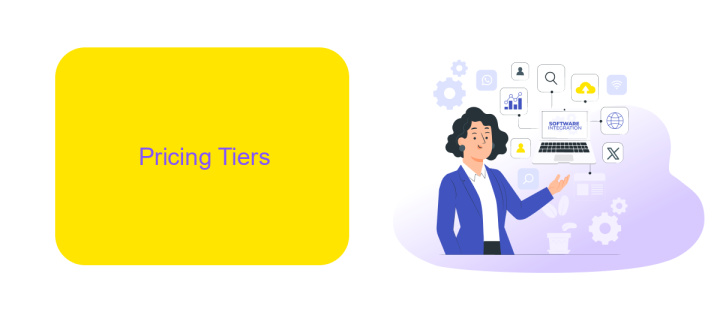Pentaho Data Integration Pricing
Pentaho Data Integration (PDI) is a powerful, open-source tool for data integration and business analytics. As organizations increasingly rely on data-driven decisions, understanding the pricing structure of PDI becomes crucial. This article explores the various pricing options available for Pentaho Data Integration, helping businesses determine the most cost-effective solution to meet their data management needs.
Monetization Methods
Pentaho Data Integration (PDI) employs various monetization methods to cater to different user needs and business scales. This allows organizations to choose the most suitable option based on their specific requirements and budget constraints.
- Subscription-based Licensing: PDI offers subscription plans that provide access to the latest features and updates, ensuring that users always have the most current tools at their disposal.
- Perpetual Licensing: For organizations preferring a one-time investment, PDI provides perpetual licenses that grant indefinite access to the software.
- Cloud Services: By leveraging cloud-based solutions, PDI offers scalable and flexible pricing models, allowing businesses to pay for what they use.
- Professional Services: PDI monetizes through consulting, training, and support services, helping organizations maximize the value of their data integration processes.
- Third-Party Integrations: Services like ApiX-Drive enable seamless integration with other platforms, enhancing PDI's functionality and creating additional revenue streams.
These monetization methods ensure that Pentaho Data Integration can meet the diverse needs of its user base, providing both cost-effective and comprehensive solutions for data integration and management.
Pricing Tiers

Pentaho Data Integration offers a flexible pricing structure designed to cater to various business needs, from small startups to large enterprises. The tiers are typically segmented based on the scale of data integration requirements, the number of users, and the complexity of the workflows. Smaller businesses can opt for the basic tier, which provides essential data integration tools and limited user access at a lower cost. This tier is ideal for companies just starting with data integration who need a cost-effective solution to manage their data flows.
For larger organizations with more complex needs, Pentaho offers advanced tiers that include additional features such as enhanced security, advanced analytics, and greater scalability. These tiers are designed to support extensive data integration projects and provide comprehensive support for enterprise-level operations. Additionally, businesses can integrate Pentaho with third-party services like ApiX-Drive to streamline their workflows further, ensuring seamless data transfer and synchronization across different platforms. This flexibility in pricing and integration capabilities allows businesses to choose a plan that best fits their operational requirements and budget.
Additional Costs

When considering the total cost of ownership for Pentaho Data Integration, it's essential to account for additional costs that may arise beyond the initial licensing fees. These extra expenses can significantly impact your budget and project timelines.
1. Implementation and Setup: Initial setup and configuration may require professional services or third-party consultants to ensure the system is tailored to your specific needs. Services like ApiX-Drive can assist in streamlining integration processes, saving both time and resources.
2. Training and Support: Investing in training programs for your team is crucial for effective utilization. Additional support packages may also be necessary to address any issues that arise during operation.
3. Maintenance and Upgrades: Regular maintenance and periodic upgrades are essential to keep the system running smoothly and securely. These activities may incur additional costs.
Considering these potential additional costs can help you better plan and allocate your budget, ensuring a more accurate estimation of the overall investment required for successful deployment and operation of Pentaho Data Integration.
Cost-Saving Options

When considering Pentaho Data Integration, there are several cost-saving options that can help you maximize your budget without compromising on functionality. One effective approach is to leverage open-source versions of the software, which offer robust features at no cost. Additionally, exploring community support forums can provide valuable insights and solutions, reducing the need for paid technical support.
Another way to save costs is by optimizing your existing infrastructure. Instead of investing in new hardware, consider utilizing cloud-based solutions that offer scalable resources on a pay-as-you-go basis. This can significantly cut down on upfront and maintenance expenses.
- Utilize open-source versions for core functionalities
- Engage in community support forums for troubleshooting
- Opt for cloud-based solutions to reduce hardware costs
- Use integration services like ApiX-Drive for seamless data connections
By implementing these strategies, you can effectively manage your Pentaho Data Integration costs while still achieving high performance and reliability. Whether you are a small business or a large enterprise, these cost-saving measures can provide significant financial benefits.
Negotiation Tips
When negotiating the pricing for Pentaho Data Integration, it's essential to be well-prepared and understand your organization's specific needs. Begin by evaluating the scale of your data integration requirements and the complexity of the tasks you need to perform. This will help you determine whether you need a more comprehensive package or if a basic plan will suffice. Additionally, consider the number of users who will be accessing the platform and any potential future growth. By presenting a clear picture of your needs, you can negotiate more effectively and potentially secure a better deal.
Another critical aspect of negotiation is to explore any available integrations and additional services that could enhance your use of Pentaho Data Integration. For instance, leveraging tools like ApiX-Drive can streamline your data workflows by automating integrations between different applications. Highlighting how these integrations can improve efficiency and reduce manual work can be a compelling argument for negotiating better pricing or additional features. Always ask about discounts for long-term commitments or bundled services, and don't hesitate to request a trial period to ensure the platform meets your expectations before finalizing the deal.
FAQ
What is the pricing structure for Pentaho Data Integration?
Is there a free version of Pentaho Data Integration available?
Are there any additional costs associated with using Pentaho Data Integration?
How can I get support for Pentaho Data Integration?
Can I automate data integration tasks with Pentaho Data Integration?
Apix-Drive will help optimize business processes, save you from a lot of routine tasks and unnecessary costs for automation, attracting additional specialists. Try setting up a free test connection with ApiX-Drive and see for yourself. Now you have to think about where to invest the freed time and money!

